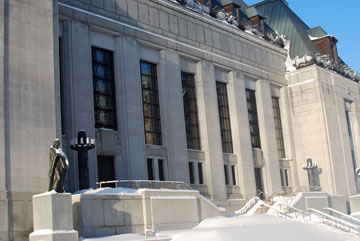Judges should decide, on a case-by-case basis, whether women can wear the niqab, a full-face veil, while testifying in court, but a blanket rule on the issue would be “untenable,” Canada’s top court ruled this morning.

“Two sets of Charter rights are potentially engaged — the witness’s freedom of religion and the accused’s fair trial rights, including the right to make full answer and defence. An extreme approach that would always require the witness to remove her niqab while testifying, or one that would never do so, is untenable,” wrote Chief Justice Beverley McLachlin for the majority in
R. v. N.S. The majority decision, supported by four of the seven judges who heard the case at the SCC, said lower courts must consider, among other things, the harm that could come if Muslim women who wear the niqab feel discouraged from reporting offenses.
But the ruling also said where a witness’s credibility is central to the case, “the possibility of wrongful conviction must weigh heavily in the balance.” Judges must also consider the sincerity of a witness’s religious beliefs.
The court dismissed an appeal from a woman, known only by the initials N.S., who accused an uncle and a cousin of sexual assault and wished to testify wearing a niqab. A preliminary inquiry judge ordered her to remove the veil when she testified, and appeals pushed the case to the Supreme Court.
Justices Louis LeBel and Marshall Rothstein concurred with the judgment on dismissing the appeal, but argued for “a clear rule that niqabs may not be worn at any stage of the criminal trial” in the interests of openness and religious neutrality.
“The public must be able to see how the justice system works. Wearing a niqab in the courtroom does not facilitate acts of communication. Rather, it shields the witness from interacting fully with the parties, their counsel, the judge and the jurors,” wrote LeBel.
Justice Rosalie Silberman Abella dissented. She argued that unless a witness’s face is directly relevant - for example, when her identity is in question - she should not be required to remove her niqab.
“The harmful effects of requiring a witness to remove her niqab, with the result that she will likely not testify, bring charges in the first place, or, if she is the accused, be unable to testify in her own defence, is a significantly more harmful consequence than the accused not being able to see a witness’s whole face,” wrote Abella.

 “Two sets of Charter rights are potentially engaged — the witness’s freedom of religion and the accused’s fair trial rights, including the right to make full answer and defence. An extreme approach that would always require the witness to remove her niqab while testifying, or one that would never do so, is untenable,” wrote Chief Justice Beverley McLachlin for the majority in R. v. N.S.
“Two sets of Charter rights are potentially engaged — the witness’s freedom of religion and the accused’s fair trial rights, including the right to make full answer and defence. An extreme approach that would always require the witness to remove her niqab while testifying, or one that would never do so, is untenable,” wrote Chief Justice Beverley McLachlin for the majority in R. v. N.S.